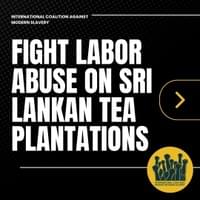
International Coalition
Against Modern Slavery
- Modern Slavery Watch
- …
- Modern Slavery Watch
International Coalition
Against Modern Slavery
- Modern Slavery Watch
- …
- Modern Slavery Watch
International Coalition
Against Modern Slavery
Forced labor and education on tea
plantations in rural Sri Lanka
“We give our blood so they live comfortably”
Tea companies have a responsibility to the communities they profit from and the environment in which they operate. As consumers, our choices are intrinsically linked to the world around us.
From 1815 to 1948 Sri Lanka was a British colony, and its colonial planters enriched themselves off of Ceylon tea from plantations using Tamil indentured laborers brought over from South India. Even after British rule ended, tea plantations and their respective estates remained under the same ownership until 1972. Under their rule, control was exerted over school systems, intentionally preventing children from completing their education – keeping them trapped on tea plantations.
Today, tea plantations are run by companies that lease land from the government. Their schools remain underfunded compared to the national Sri Lankan education system, with declining resources and high dropout rates. Cycles of exploitative violence continue, with communities reporting high rates of abuse, underpaid child labor, wage theft, and even forced labor.
Tea plantation workers are often denied payment, with 44% of families in tea estate areas remaining food insecure despite working long and harsh hours. “If we work 22 or 23 days, because of all the cuts we only get about 15, 16 days’ worth of pay. And then when they cut everything… they give us, there’ll be no salary left”, one tea plantation worker recounts.
Investing in communities and empowering workers is key to combating abuse, exploitation, and labor trafficking. Youth Voice International, partners of the International Coalition Against Modern Slavery, have conducted extensive research on the conditions of youth on Sri Lankan tea plantations, and how the lack of education access resulting from colonial rule continues to perpetrate the same cycles of exploitation. Currently, we are working with them to raise money for their plans to expand the capacity of their local school. Their proposed changes would ensure Tamil youth growing up on tea plantations in their community would have the opportunity to complete their education, which is key to reducing vulnerability to labor trafficking and other forms of abuse.Learn more about forced labour at tea plantations using these resources
- Article written by our partners Youth Voice International: https://digitalcommons.uri.edu/cgi/viewcontent.cgi?article=1377&context=dignity
- https://www.business-humanrights.org/en/latest-news/sri-lanka-workers-on-sri-lankan-tea-plantations-supplying-major-companies-including-lipton-tetley-and-yorkshire-tea-living-in-poverty-and-squalor-and-subjected-to-abuse-by-supervisors-incl-company-responses/
- https://www.amnesty.org/en/latest/news/2020/06/sri-lanka-it-is-time-to-change-the-narrative/
- https://www.theguardian.com/global-development/2023/may/23/we-give-our-blood-so-they-live-comfortably-sri-lankas-tea-pickers-say-they-go-hungry-and-live-in-squalor
Actions you can take
Help educate your community
Help educate your community about protecting the rights of those who work on tea plantations and advancing education for youth growing up on tea plantations
Take the pledge and stand with Sri Lankan tea workers
TAKE THE PLEDGE HERE.
Pledge to:- Boycott non-fair trade tea. While fair trade labels are not a complete guarantee of abuse-free products, the fairtrade certification process is key in reducing exploitation.
- Pressure tea companies to take action. We demand that tea companies ensure workers at each level of supply chains are paid fair wages, have safe working conditions, and have a protected right to organize. We demand that tea companies contribute financially to the communities they source from, clearly communicate how their tea is sourced, and implement sustainable farming practices.
- To start with we request that the relevant tea company pay 15,000 USD towards the repair of the remote Puperessa school, the addition of two classrooms, a play area and a toilet block. The school is here: https://g.co/kgs/Gij5yqB
Support Youth Voice International in
expanding access to education
Their proposed changes would ensure Tamil youth growing up on tea plantations in their community would have the opportunity to complete their education, which is key to reducing vulnerability to labor trafficking and other forms of abuse. You can donate to the campaign here.
International Coalition Against Modern Slavery



